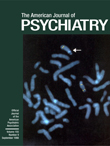Pilot Study of the Cytochrome P450-2D6 Genotype in a Psychiatric State Hospital
Abstract
Objective: The authors conducted a pilot study to develop preliminary data on the frequency of cytochrome P450-2D6 (CYP2D6) genotypes in state psychiatric hospital patients and to establish population sizes needed to determine potential clinical relevance in therapeutic outcome.Method: One hundred consecutive inpatients at Eastern State Hospital in Kentucky who provided informed consent were genotyped at the CYP2D6 locus during their hospital stay.Results: Twelve of the patients were CYP2D6 deficient, and four carried the *1Xn or *2Xn allele associated with ultrarapid metabolism; all of these patients were Caucasian (N=87). The rate of deficiency in CYP2D6 expression in these Caucasian state psychiatric hospital patients (14%) was twice that of the U.S. population (7%). The patients with CYP2D6 deficiency also appeared more likely to experience side effects in response to CYP2D6 medications.Conclusions: This study, limited by a small number of subjects, suggests that one-fifth of Caucasians admitted to a state hospital in Kentucky had genotypes associated with extremes in CYP2D6 activity that may have affected their response to CYP2D6 medications. Am J Psychiatry 1998; 155: 1278-1280



